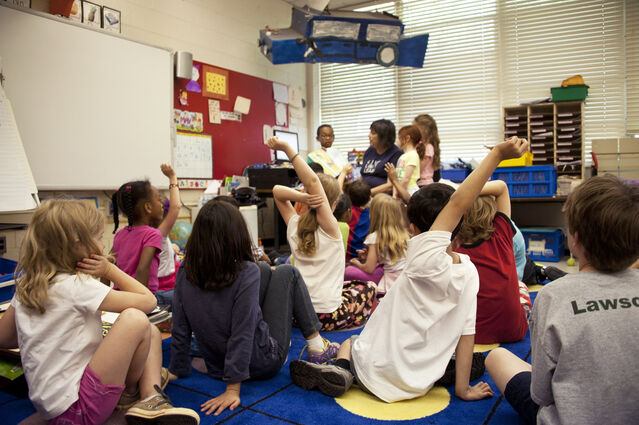Coronavirus Disease 2019
Your Child's Academic Progress After More Than Two Years of COVID-19
School may be somewhat back to normal, but now is not the time to sit back.
Posted July 19, 2022 Reviewed by Michelle Quirk
Key points
- While it’s tempting to just relax after all of the changes we have experienced in the past couple of years, parents can’t afford to do so.
- After a return to some normalcy, now is a time to evaluate how your child is doing academically.
- Parents should ask teachers specific questions that rely upon objective data that aren’t influenced by teacher bias.
Summer is here, and so many of us want it to be a respite from the stress of the last few years. Just think about all we have been through: the pandemic lockdown, the murder of George Floyd, the protests that followed, the election, January 6, and the continuing presence of COVID-19. Maybe now that you have been vaccinated and school is somewhat back to normal, you may think you can rest—but no. Read on.
Although you may wish to take a break after a year of what might have seemed to be a return to more normal schooling, I suggest that, before doing so, you take a few moments to examine whatever data you have that can help you understand how your children progressed academically over the past few years. If your children's progress isn’t where you or their teachers think it should be, this is an opportune time to use what’s left of the summer to create a work plan for the 2022–23 school year.

While you may expect or want your children’s teachers to come to you and share their concerns, realize that teachers never want to tell parents that their children aren’t thriving, and they are particularly wary of delivering less-than-positive news when they know how stressed parents are—as they have been over the past few years. I call this the Pollyanna Effect, where a teacher’s anxiety about upsetting a parent can prevent them from delivering important information—information the parent may need to act on. As a result, it is important that you, the parents, take this step to inquire more specifically about your children’s performance, and that you do not necessarily expect the school to come to you with their concerns.
Parents should ask questions about their children’s progress in ways that encourage teachers to consider student history and performance more thoroughly and to speak in a clear, data-driven manner. These questions can also help clarify any recent teacher statements that have seemed critical of their children.
Questions for Teachers
Here are some questions for teachers that dig a little deeper than the more general, "How is my child doing?" They overlap with some of those I included in the conference and report card blog posts earlier this year.
- Have you collected any data on my child’s performance with standardized measures?
- When were these data collected and when will the school get the results?
- When will the school communicate the results to parents?
- What do the results mean? (You would be surprised at how many parents and even teachers don’t fully understand how to interpret the test results they are given. If you’re still not clear with the answer you receive, go to the principal or their designee.)
- How has my child been doing on in-class assessments?
- Have you had to modify or alter how my child takes tests?
- Does my child need more time, make careless mistakes, rush, or give up when tested?
- Does my child seem to understand a concept well when you explain it but then have difficulty demonstrating this knowledge on a test?
- How is my child doing relative to his/her classmates and by how much? (Although few teachers want to tell parents that their children's standing falls below that of their peers, parents need to know this. You can’t address your children’s progress if you don’t know where it falls. If their performance falls in the middle or below most classmates, you might also want to ask whether better concentration, effort, motivation, or organization might significantly improve it. These dimensions of learning are often markers of executive-functioning deficits and attentional challenges like attention-deficit/hyperactivity disorder (ADHD). It is just as possible that your children may excel in one or more areas and that their performance may be significantly higher than that of their peers. Knowing how large this gap is can help you plan for their academic enrichment.)
- Do you recommend additional work, tutoring, or testing for my child?

Certainly, you don’t want to ask all of these questions, or at least not in rapid succession. You can ask some one day and the others on another as a means of information gathering. Then, pull the total of the teacher’s responses together and see where they leave you. I am, however, laying out the type of questions you want to ask that are very specific and enable the teacher to be transparent with you and even lead the teacher to perhaps reflect more carefully on your child’s performance and factors that might influence it as well as what might be done about any shortcomings.

Pay attention to whether multiple points of lower performance span several years or fall within a shorter time frame. Sometimes the explanation for a dip in performance is that your child is new, building stamina, or working on studentship. A loss or trauma in the family can also be a cause. Just be careful not to ignore the possibility of other potential causes like learning issues or a behavioral health diagnosis. These can still be explanations for lower performance, even in a pandemic, and their influence should not be ignored.
Creating a Plan for Closing the Gap
If your child’s performance is significantly below that of the majority of his or her peers, you ideally want the school to create a plan for narrowing that gap. You want a plan that can be reviewed after a reasonable period of intervention, whether that intervention is being delivered by you at home, by an outside tutor, or at school with your child’s regular teacher or a specialist.
You should expect to see growth within six to eight weeks, and there will almost always be growth. The more important question is whether that growth is significant enough to close the gap between your child and his or her peers. In addition to targeting the underlying weakness, the rate of growth is more likely to increase when the intervention is delivered with enough frequency and duration. If you find that your child is not making significant progress, you may need to seek a professional evaluation to get a better sense of the root of your child’s difficulty, especially if the slope of improvement or the degree of improvement is minimal.


